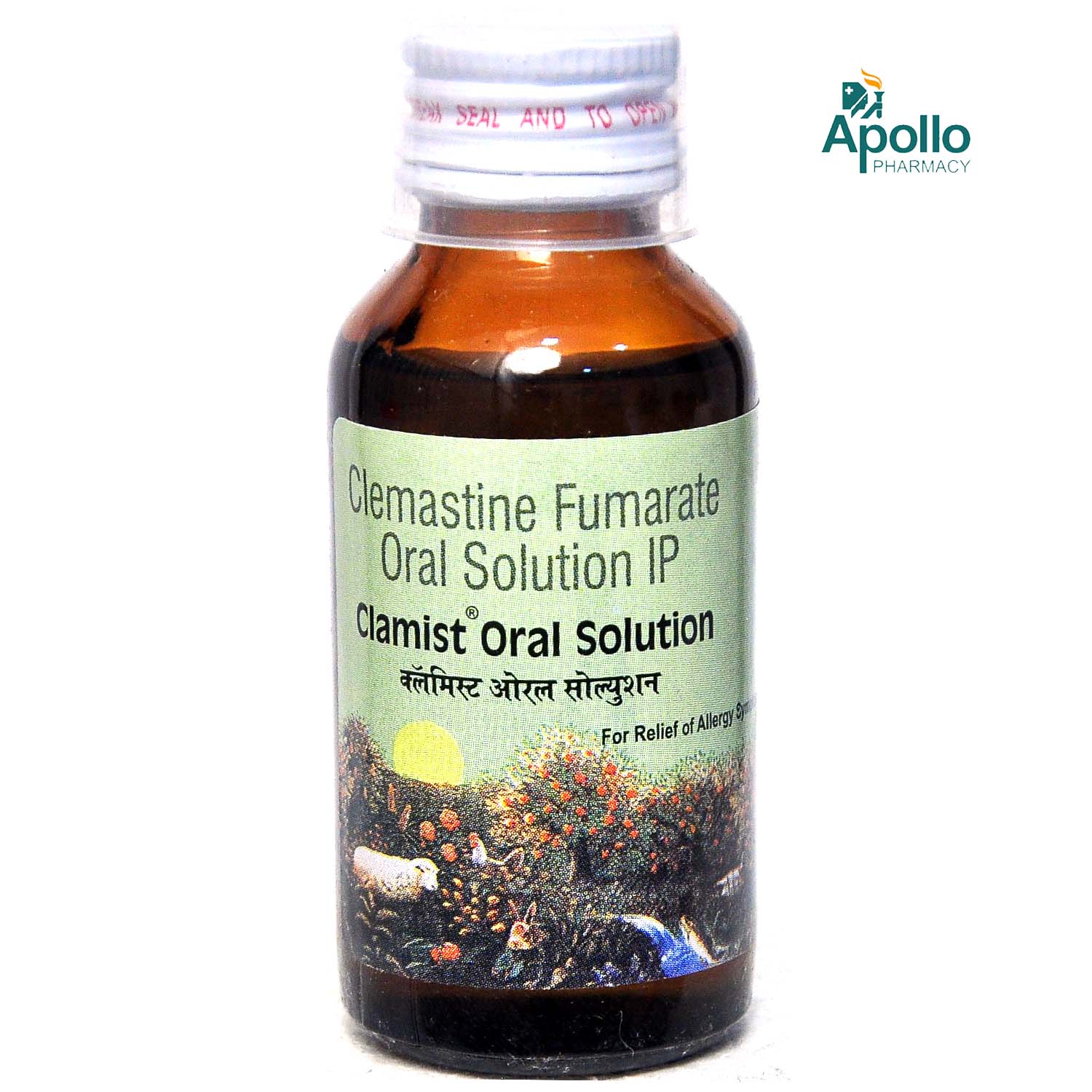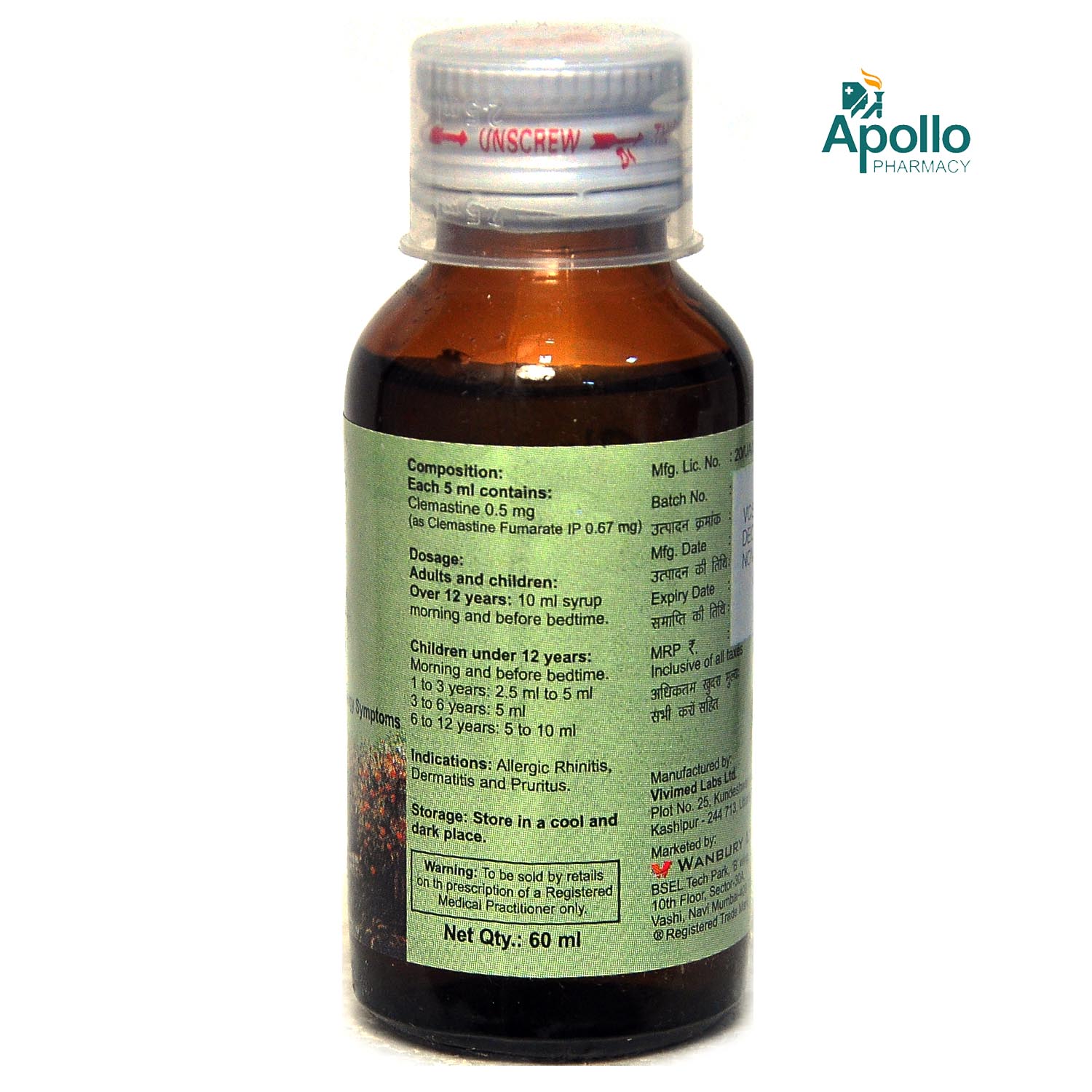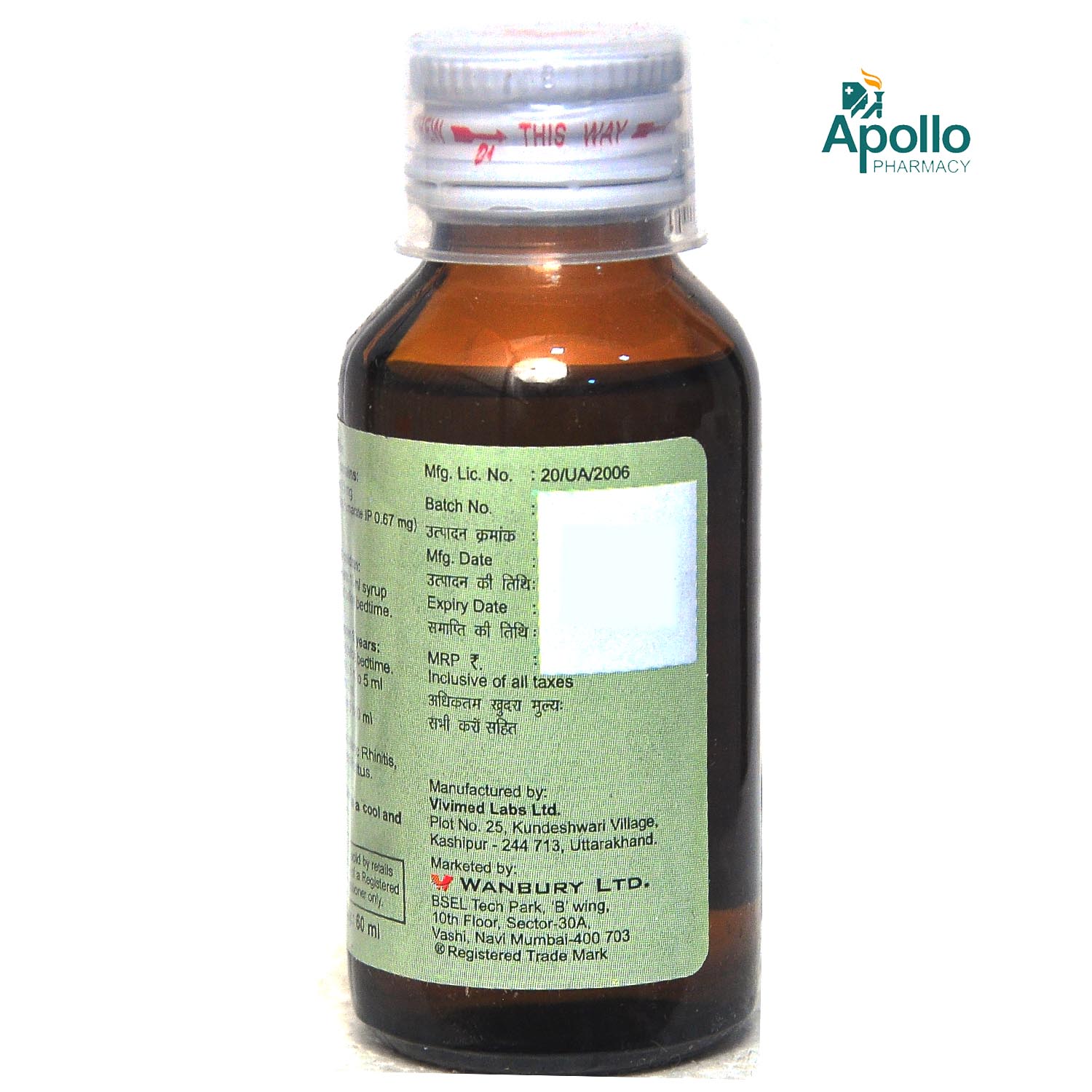Clamist Oral Solution 60 ml
MRP ₹97.5
(Inclusive of all Taxes)
₹14.6 Cashback (15%)
Provide Delivery Location
Online payment accepted
 Prescription drug
Prescription drugWhats That
Composition :
Manufacturer/Marketer :
Consume Type :
Expires on or after :
Return Policy :
About Clamist Oral Solution
Clamist Oral Solution belongs to a class of medicines called 'anti-histamine', which are used in the treatment of allergic reactions like allergic rhinitis and urticaria. Allergic rhinitis is a type of inflammation in the nose which occurs when the immune system overreacts to allergens in the air. Urticaria, also known as hives, is an outbreak of swollen, pale red bumps or plaques (wheals) on the skin that appear suddenly, either due to the body's reaction to certain allergens or unknown reasons.
Clamist Oral Solution contains 'clemastine', belonging to a class of medicines called 'anti-histamine', which are used in the treatment of allergic reactions like allergic rhinitis and urticaria. Which works by blocking the action of certain chemical messengers that are responsible for inflammation, congestion, itching and other allergic reactions.
Clamist Oral Solution should be taken as advised by your doctor. Clamist Oral Solution can cause some side effects like dizziness, drowsiness, dry mouth, and changes in vision. These side effects resolve on their own. If it persists, stop taking this medicine and consult your doctor.
You should not take Clamist Oral Solution if you are allergic to Clamist Oral Solution. Tell your doctor about other medicines you use other than the Clamist Oral Solution. Do not use Clamist Oral Solution without the advice of your doctor. Clamist Oral Solution should be used with caution if you are pregnant/breastfeeding. Clamist Oral Solution used with caution in patients with narrow-angle glaucoma, galactose-intolerance, stenosing peptic ulcers ( painful sores in the lining of the stomach, esophagus, or small intestine), prostatic-hypertrophy, epilepsy and asthma.
Uses of Clamist Oral Solution
Directions for Use
Key Benefits
Clamist Oral Solution contains 'clemastine' belonging to a class of medicines called 'anti-histamine' which are used in the treatment of allergic reactions like allergic rhinitis and urticaria. It works by blocking the action of certain chemical messengers that are responsible for inflammation, congestion, itching and other allergic reactions. It is also used in the treatment of angioedema (Painless swelling under the skin, triggered by an allergy to animal dander, pollen, drugs, venom, food or medication).
Storage
Drug Warnings
You should not take Clamist Oral Solution if you are allergic to Clamist Oral Solution. Tell your doctor about other medicines which you are using other than the Clamist Oral Solution. Do not use Clamist Oral Solution without the advice of your doctor. Clamist Oral Solution should be used with caution if you are pregnant/breastfeeding. Clamist Oral Solution used with caution in patients with narrow-angle glaucoma, galactose-intolerance, stenosing peptic ulcers ( painful sores in the lining of the stomach, esophagus, or small intestine), prostatic-hypertrophy, epilepsy and asthma.Clamist Oral Solution is used with caution in patients like bladder neck obstruction,porpyria. Clamist Oral Solution is not recommended for use in newborns and premature infants due to the increased risk of serious side effects.
Drug-Drug Interactions
Drug-Drug Interactions
Login/Sign Up
Taking Clamist Oral Solution 60 ml and Potassium chloride(in tablet or capsule form) together can increase the risk of stomach ulcers, bleeding, and other gastrointestinal injury.
How to manage the interaction:
Taking Clamist Oral Solution 60 ml with Potassium chloride is not recommended, as it can lead to an interaction, can be taken if your doctor has prescribed it. However, if you experience severe stomach pain, bloating, sudden lightheadedness or dizziness, nausea, vomiting (especially with blood), decreased hunger, dark, tarry stools, consult the doctor immediately.
Taking Clamist Oral Solution 60 ml and Potassium citrate (in tablet or capsule form) together can increase the risk of stomach ulcers, bleeding, and other gastrointestinal injury.
How to manage the interaction:
Taking Clamist Oral Solution 60 ml with Potassium citrate is not recommended, as it may lead to an interaction but can be taken if prescribed by the doctor. However, if you experience severe stomach pain, bloating, sudden lightheadedness or dizziness, nausea, vomiting (especially with blood), decreased hunger, or dark, tarry stools, consult the doctor immediately. Do not discontinue any medications without a doctor's advice.
Topiramate can cause increased body temperature and decreased sweating, and these effects may be worsened when combined with medications like Clamist Oral Solution 60 ml.
How to manage the interaction:
Co-administration of Clamist Oral Solution 60 ml with Topiramate can possibly result in an interaction, but it can be taken if your doctor has advised it. If you're having any of these symptoms, like less sweating, feeling hotter, heat stroke, feeling sleepy, dizzy, or lightheaded, it's important to contact your doctor immediately. Do not stop using any medications without talking to your doctor.
Coadministration of Clamist Oral Solution 60 ml with Zonisamide can increase the risk or severity of Zonisamide side effects like increased body temperature and decreased sweating especially in warm weather.
How to manage the interaction:
Taking Clamist Oral Solution 60 ml with Zonisamide together is not recommended as it can result in an interaction, it can be taken if your doctor has advised it. However, if you experience changes in blood pressure, increased heart rate, fever, or excessive sweating, contact a doctor immediately. Make sure to hydrate yourself during warm weather or after exercise. Do not discontinue any medications without consulting a doctor.
Drug-Food Interactions
Drug-Food Interactions
Login/Sign Up
Diet & Lifestyle Advise
- Staying hydrated is vital for those with a cough or cold. Drinking liquids at room temperature can alleviate cough, runny nose and sneezing.
- The immune system is affected by stress and raises the risk of being sick. An individual can exercise regularly, meditate, do deep breathing and try progressive muscle relaxation techniques to relieve stress.
- To stay fit and safe, try to sleep 7-9 hours each night.
- It is advised to avoid contact with known allergens (allergy-causing agents) such as pollen, dust, etc. Certain food items are known to cause allergies to you.
- Maintain personal hygiene and keep your surroundings clean.
Side Effects of Clamist Oral Solution
- Dizziness and Drowsiness
- Fatigue
- Dry mouth
- Upset stomach
- Nausea
- Headache
- Changes in vision
- Difficulty in breathing or swallowing
- Swelling of the face, lips, tongue or throat
Habit Forming
Therapeutic Class
All Substitutes & Brand Comparisons
Drug-Diseases Interactions
Drug-Diseases Interactions
Login/Sign Up
FAQs
Drug-Drug Interactions Checker List
- PHENELZINE
- SELEGILINE
- ZOLPIDEM
- CHLORDIAZEPOXIDE
- TOPIRAMATE
- IPRATROPIUM BROMIDE
- ATROPINE
- ALPRAZOLAM
- BETAHISTINE
- SODIUM OXYBATE
- ZAFIRLUKAST
- CODEINE
- HYDROCODONE
- LORAZEPAM
- CARISOPRODOL
- CETIRIZINE
- DIPHENHYDRAMINE
Special Advise
- It is advised to avoid contact with known allergens (allergy-causing agents) such as pollen, dust, etc. Certain food items are known to cause allergies to you.
- Maintain personal hygiene and keep your surroundings clean.
Disease/Condition Glossary
Allergic rhinitis: When the immune system overreacts to allergens in the air, allergic rhinitis, a type of nasal inflammation, results. Runny or stuffy nose, sneezing, red, itchy, and watery eyes, as well as swelling around the eyes, are signs and symptoms of this condition. Dust mites, pollen, spores, animal skin, urine, and saliva are among the most common airborne allergens that cause rhinitis.
Urticaria: Hives, or urticaria, are sudden outbreaks of swollen, pale red bumps or plaques (wheals) on the skin that can occur as a result of an immune system reaction to certain allergens or for unknown causes. The skin's surface may develop welts that are itchy, raised, red, or skin-coloured.

Have a query?
Alcohol
Safe if prescribed
Consumption of alcohol is not recommended during treatment with this medicine due to the increased risk of side effects such as dizziness, drowsiness and difficulty in concentration. It is advised that you do not perform any activities that require high mental alertness, like driving a vehicle or operating machinery, if you consume alcohol during treatment with this medicine.
Pregnancy
Consult your doctor
Clamist Oral Solution is not recommended for use in pregnancy unless necessary. All the risks and benefits should be discussed with the doctor before taking this medicine.
Breast Feeding
Consult your doctor
Clamist Oral Solution is not recommended for use in breastfeeding unless necessary. All the risks and benefits should be discussed with the doctor before taking this medicine.
Driving
Safe if prescribed
Clamist Oral Solution may decrease your alertness and vision or make you sleepy and dizzy. Do not drive if these symptoms occur. Caution is advised when driving or operating machinery.
Liver
Consult your doctor
Clamist Oral Solution should be used with caution if you have liver disease. Dose adjustment may be needed. Please consult your doctor before taking Clamist Oral Solution.
Kidney
Consult your doctor
Clamist Oral Solution is probably safe to use if you have kidney disease. Dose adjustment may be needed. Please consult your doctor before taking Clamist Oral Solution.
Children
Safe if prescribed
Clamist Oral Solution can be used with caution in children only if the doctor advises. But it is not prescribed in neonates.









